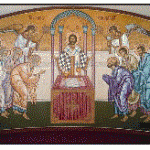It must be remembered that for Paul the Church was the Body of Christ continued in time. Unity was key to this idea of the Body of Christ. In Corinth, when the meal ceased to be a common meal, this brought the hierarchical distinctions of this world into the Body of Christ. Paul preached that these differences should not be replicated in the community that followed Christ since the Church was a new expression of creation – an expression that was made in the image of what God intended when He created mankind.
 This conflict is the context in which Paul recalls for the Corinthians the words used when recalling what Jesus said at the Last Supper. Paul writes this:
This conflict is the context in which Paul recalls for the Corinthians the words used when recalling what Jesus said at the Last Supper. Paul writes this:
For I received from the Lord what I also handed on to you, that the Lord Jesus on the night when he was betrayed took a loaf of bread, and when he had given thanks, he broke it and said, “This is my body that is for you. Do this in remembrance of me.” In the same way he took the cup also, after supper, saying, “This cup is the new covenant in my blood. Do this, as often as you drink it, in remembrance of me.” For as often as you eat this bread and drink the cup, you proclaim the Lord’s death until he comes.
The text concludes with: “Whoever, therefore, eats the bread or drinks the cup of the Lord in an unworthy manner will be answerable for the body and blood of the Lord.” In this context, eating and drinking the bread and wine “in an unworthy manner” refers to the behavior of the wealthy in perpetuating the divisions of “this world.” In Christian communities, those divisions were abolished.
We see that Paul understood that Christ came to restructure society – to make sure that all humans were equal and treated in an equal manner. Christ’s teachings, which proclaim that all humans are part of one family, wipes out all earthly distinctions or any type of stratified society. What Jesus encountered in the society into which He was born, was a society that was very stratified. It was stratified not only along the lines of wealth, but along the line of faith. Even the particular “religious group” a person belonged to determined his position in society.
Think about what you know of the society in which Jesus lived. Hatred for the Romans, Samaritans, Gentiles, sick and handicapped, lepers, poor and those who worked for the Romans (e.g., tax collectors) was rampant and a real part of society. There was no equality. Jesus preached against these distinctions and, as we see in the Gospels, embraced those who others hated.
Such differences, of course, arose in newly converted communities – it appears to be a natural tendency of humankind.
Within Christian Communities All Are supposed to be Equal!
